Thirsty Classics is a nine-week miniseries celebrating lesbian cinema from before 1980. We often talk about these films like homework or mere stepping stones, but Drew is here to share how they can be fun… if you’re horny enough. This week: Yasuzô Masumura’s Manji starring Kyôko Kishida and Ayako Wakao.
My favorite type of queer cinema classic is the kind that constantly begs the question: Is this real? Is this a real movie? Is this a real movie made in (insert year)?
The answer is yes, because what we have to remember is people have always been as horny and insane as we are today. Sure, certain censorship and cultural norms created restrictions. But that’s why it’s fun to venture outside American cinema.
Because Manji came out in Japan in 1964. And It. Is. Crazy.
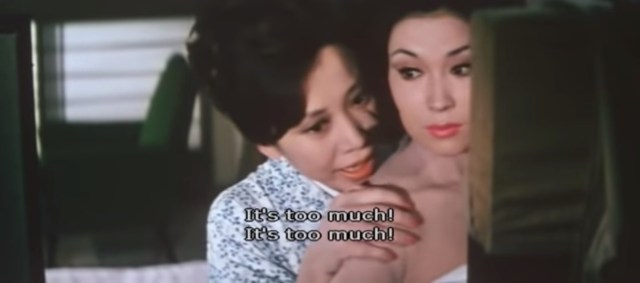
It really is
Yasuzô Masumura directed over sixty films, many which were classified as exploitation. But his movies were never just about showing sex. They were about showing individuals yearning for freedom, bursting with passion. They were about escaping social normativity and respecting desire.
Sonoko Kakiuchi, the protagonist of Manji, has enough desire for us all. She tells her tale in flashbacks. She and her husband moved to Osaka so he could open a law office. She didn’t want to stay home doing nothing so she “found an art school for ladies.”
Before she even meets Mitsuko Tokumitsu she develops a crush. People start talking when her “Goddess of Mercy” in figure drawing class looks nothing like the model and everything like Mitsuko. The credits roll over this class. Lush close-ups of the model’s body establish that this movie will have nudity… and so much more.
Sonoko decides the only way to stop these rumors is to talk to Mitsuko. This is a great idea if your intention is not actually to stop rumors but rather to make those rumors come true. She finds her in the women’s bathroom putting on lipstick. Mitsuko turns around and smiles.
Mitsuko is a high femme daydream nightmare. She looks modern in her cute dress, 60s hair, and heavy eyeliner. The point is her beauty should make you want to kill yourself, and, like, I get it. Mitsuko says the bathroom isn’t a safe place to talk, but could they go somewhere else? Sonoko gets so excited, too excited, just the right amount of excited. From the very beginning, she’s completely inept at hiding a single emotion. It’s amazing.
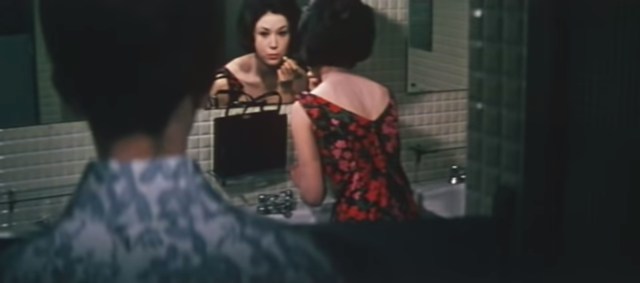
It would be incredibly healing for me to have an encounter like this in a women’s bathroom
They quickly become friends. They go on secluded walks and hold hands and brazenly flirt with one another. Mitsuko happily announces that the rumors about them have ended her engagement. And Sonoko eagerly shows her husband her finished drawing based on Mitsuko. “But she’s really far more sensual,” Sonoko tells him as he cluelessly nods.
Mitsuko takes issue with the drawing. The face is like hers but the body is not. She says this as SHE RUBS HER BODY. Then Sonoko is like, well, maybe I could draw it better if I SAW YOU NAKED. It really plays out like a wonderfully written porn scene. Mitsuko expresses concern undressing in Sonoko’s bedroom. “The marital bed is quite sacred they say.” Sonoko greedily replies, “So is a virgin’s body. So it’s quite fitting. Hurry and show me.”
I know.
Mitsuko starts to undress and Sonoko grabs her. “It’s too much! It’s too much! When I see something beautiful I become so excited I cry.” Okay Bette Porter!
Sonoko continues with an immense amount of emotion (and aggression) and it feels very manipulative and questionable in terms of consent. At least until Mitsuko starts yelling, “Kill me! I want to be slain by you!” And they kiss! She then says, “It’s not fair. You saw my body but you won’t show me yours.” Sonoko undresses and they hug naked and it’s really hot and beautiful and you’re just like wow I’m so glad these insane women found each other there’s hope for us all.
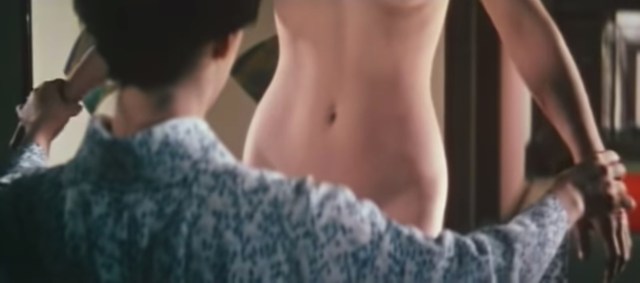
Everyone knows 1st base for lesbians is grabbing both arms, spreading them apart, and admiring your lover’s body
They start writing letters to each other that include bad poems (a lesbian classic) and lines like: “Dearest, I’m always moody on Sundays. Why? Because I can’t see you all day.”
Finally, finally, Sonoko’s husband starts to get suspicious. Sonoko’s responses are increasingly hilarious. “I’d prefer you didn’t discuss my friends. You find your own friends and leave me alone!” “Love between women is like the love of a work of art.” “Her body’s so beautiful, I want to hold her! I could gaze at her for hours on end.” She says these things TO HER HUSBAND. (Can you tell I sort of want to stop with the commentary and just publish the whole screenplay??)
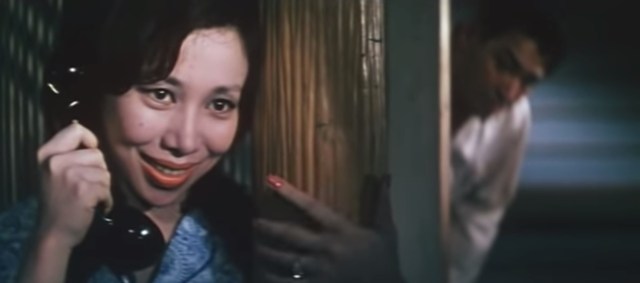
“I’m very subtle. He just thinks we’re friends.”
Sonoko’s husband is surprisingly reasonable. He says that he‘s sorry. He knows he can be moody and he’s going to work on being a better partner. But would she just stop spending time with her hot friend? Sonoko says no. Okay, well, then could she at least not have sex in their bedroom? Sonoko once again says no. She will not be bound. She demands total freedom.
I know.
Like most old lesbian movies, the first twenty minutes really are the best. (Yes, you read that correctly. I’ve only described the first twenty minutes.) But the rest of the movie is certainly not boring or without top notch gay content.
The purity of their romance is interrupted by Mitsuko’s former fiancé. Well, it turns out he’s actually her current fiancé, and Sonoko feeling scorned decides to recommit herself to her husband. This doesn’t work. First of all, she’s very, very gay. Second, it’s not long before Mitsuko gets ahold of her again. She makes up a pregnancy and makes up a pregnancy-related illness and begs Sonoko to come help her.
Mitsuko writhes around complaining of cramps. “Please get on my back and press down!” A classic cure for cramps. “Such pain,” Mitsuko says. “It’s punishment for what I did to you.” Sonoko knows Mitsuko is lying, and Mitsuko knows Sonoko knows she’s lying. But they continue this charade, Sonoko digging her knees into Mitsuko as she erotically moans. It’s a lot. It’s good. I enjoyed it.
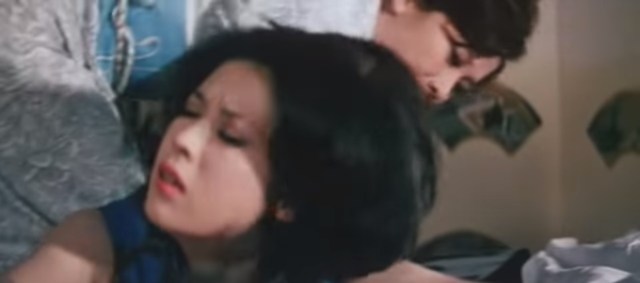
Everyone knows 2nd base for lesbians is digging your knees into your lovers back while they fake pregnancy pains
It’s unclear whether Mitsuko actually likes her fiancé or not. Sonoko can’t tell and neither can we. She goes back and forth between asking Sonoko to help her escape and apologetically explaining that she must be shared. That is until her fiancé tries to get rid of Sonoko by blackmailing her to her husband. This doesn’t work, because, as we know, Sonoko’s husband is pretty aware of everything and is generally really casual about it all.
Mitsuko and Sonoko decide to fake attempt suicide as a warning to both men. They’re going to write suicide notes and then take sleeping pills… just not that many sleeping pills. “If I die by mistake you’ll die too, won’t you?” Sonoko asks. Mitsuko says yes, like that makes any sense whatsoever.

The Romeo and Juliet remake we deserve
They don’t die, but while Sonoko is passed out, Mitsuko wakes up and, wait for it, starts sleeping with Sonoko’s husband.
I know.
They begin a throuple and not just any throuple. A throuple where Mitsuko keeps the married pair heavily sedated at all times. Husband and wife are less concerned about being continuously poisoned and more concerned about whether the other one is being poisoned slightly less and getting more one on one time with Mitsuko. They bond over the fact that they would happily die if Mitsuko asked them to.
And then one day she does. “Let’s die,” Mitsuko says. Sonoko and her husband happily nod.
Two out of three are successful. Sonoko feels betrayed. But the camera pans to her rendering of the Goddess of Mercy. The film seems to suggest that maybe Mitsuko really did love Sonoko the most. Maybe she killed herself as an act of mercy, freeing Sonoko once and for all.
(If you think reading this means you’ve basically seen the movie, I want you to know that you haven’t. I didn’t even touch upon the blood pact scene.)
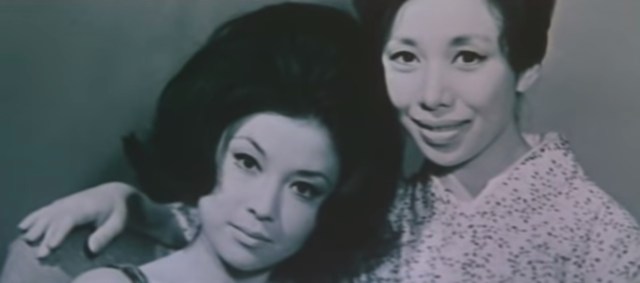
Release this weird gay movie on Criterion, you cowards!
It’s comforting to watch people go mad for love. We all feel like this. A little bit. Sometimes. Hopefully we catch ourselves before a suicide attempt, but that crazed feeling of needing someone so badly you’ll do anything is fairly universal. And Manji suggests this instinct is only increased by queerness. Because your love is not just about your love. It’s about your identity. It’s about your freedom.
I hope Sonoko cries for a bit and then realizes that she can be gay without Mitsuko. I hope she finds herself outside this one very toxic, literally toxic relationship. But who knows. She might be doomed. She seemed pretty crazy about her.



This is an ahhhmazing review and sounds like a wild ride of a movie. How do I watch? How do I hold a screening party full of lesbians?
Thanks!
It’s on YouTube!!
https://www.youtube.com/watch?v=col_Ny83C8U
Great review, and thanks for the link!
I know.
bless you for sharing this
The secret to making your friends watch your horrible lesbian guilty pleasures with you is: Food.
Make them bring the booze, you dish out the edibles. Works every time.
Oh,wow.
Maybe I’ll abuse my newly reclaimed YouTube account and do some midnight watching with a large tub of ice cream for this movie. I was actually going to comment something along the lines of “Ungh, why does it always have to end in suicide!” but…the heroine of this crazy tale of uh, art appreciation and laudanum is actually alive at the end of all of this? Well, progress is progress.
Would you be so kind as to give me a warning before you review the 1958 version of “Mädchen in Uniform”? because I love that movie with all of my heart and several horcruxes worth of soul.
It’s a nice twist! Still got suicide, but the protagonist survives!
I’ve actually never seen the 1958 version of Mädchen! I’m obsessed with the original though…
I’m calling dibs on watching the 1958 version with you whenever the two of us hang out in the same postal code!
I’ve made: All of my roommates, all of my gay guy friends, a good part of the Norwegian students in Berlin delegation, half of my class mates in college, the girl I accidentally already knew and internet blind dated, don’t ask, the girls I met in line at the restroom at a gay bar in Munich and the entirety of a lesbian party meet up group in Berlin watch this movie with me.
And still, just last year I was literally exclaiming, upon reading the newspaper one day,”NOW I get the ending!”
I love and relate to this sharing a lesbian film dedication!
Have you seen the original? How does it compare?
This one has been on my watchlist for years! I should finally actually watch it.
The book has been on my reading list for a while, glad to finally see a review of the movie on Autostraddle!
While we’re talking about Japanese lesbian classics, let me take this time to recommend Yoshiya Nobuko, who was maybe the most popular novelist of the Showa Era? And also suuuuuuuper gay.
Thank you!! I will check out her work!
AMAZING REVIEW, DREW!!!! I think this is the first time in my life I totally agree with a critic.
And thanks for the best advice ever: “But that’s why it’s fun to venture outside American cinema.” Take Drew’s word because she knows what she’s talking about.
I have a question for you, did you see the other versions of this movie (as far as I know there’s 3 other Japanese versions and Liliana Cavani’s adaptation of the same novel known as Interno Berlinese) In my opinion, nothing beats the original but I do have a weakness for Liliana Cavani.
I have not! But I will DEFINITELY check out the Liliana Cavani version especially.
Wow. this sounds like so, so much in a good way. I’m really loving this series, Drew!
I didn’t know that this (these) movies were based on a Jun’ichirō Tanizaki novel! I loved reading In Praise of Shadows in college. Now I want to see this even more.
This review is amazing and had me laughing out loud.